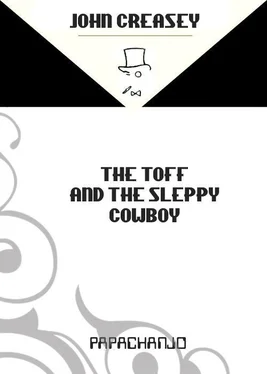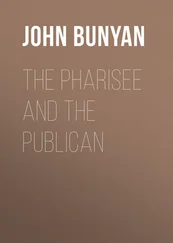John Creasey - The Toff and The Sleepy Cowboy
Здесь есть возможность читать онлайн «John Creasey - The Toff and The Sleepy Cowboy» весь текст электронной книги совершенно бесплатно (целиком полную версию без сокращений). В некоторых случаях можно слушать аудио, скачать через торрент в формате fb2 и присутствует краткое содержание. Жанр: Старинная литература, на русском языке. Описание произведения, (предисловие) а так же отзывы посетителей доступны на портале библиотеки ЛибКат.
- Название:The Toff and The Sleepy Cowboy
- Автор:
- Жанр:
- Год:неизвестен
- ISBN:нет данных
- Рейтинг книги:5 / 5. Голосов: 1
-
Избранное:Добавить в избранное
- Отзывы:
-
Ваша оценка:
- 100
- 1
- 2
- 3
- 4
- 5
The Toff and The Sleepy Cowboy: краткое содержание, описание и аннотация
Предлагаем к чтению аннотацию, описание, краткое содержание или предисловие (зависит от того, что написал сам автор книги «The Toff and The Sleepy Cowboy»). Если вы не нашли необходимую информацию о книге — напишите в комментариях, мы постараемся отыскать её.
The Toff and The Sleepy Cowboy — читать онлайн бесплатно полную книгу (весь текст) целиком
Ниже представлен текст книги, разбитый по страницам. Система сохранения места последней прочитанной страницы, позволяет с удобством читать онлайн бесплатно книгу «The Toff and The Sleepy Cowboy», без необходимости каждый раз заново искать на чём Вы остановились. Поставьте закладку, и сможете в любой момент перейти на страницу, на которой закончили чтение.
Интервал:
Закладка:
As they had driven across Clapham Common, Tommy had been quiet almost for the first time, until he said wistfully:
“England sure is green.”
“In daylight, this common is lovely,” Pamela told him. “Common?”
“Or park, I suppose you’d call it,” she explained. “A patch of open land inside the city.” She turned into the driveway, explaining : “I can put the car away afterwards.”
“Where does it go?” he asked.
“In the garage.”
“How do you get there?”
“Drive straight on to the side of the house.”
“Is it dark in your garage?”
“It is if I don’t put the light on,” she said.
He bent down and kissed the side of her cheek. She fell silent as she drove on. Either her father or her brother had left the garage doors open, and the dipped headlights of the little car showed the shelves on one side, with tools and tins of paint and a few off-cuts of wood, with old tyres hanging on the wall at the far end. She drew the car to a standstill, and sat without moving. Tommy opened his door and eased his legs out.
“Come,” he said.
She moved across to get out, and into his arms.
He held her so tightly that she could hardly breathe, but soon he let her go. He kept one hand on hers as they went out of the garage, for here there was no room for him to stand. Outside on the driveway, in the shadow of the laurels, he swung her round to face him and took her in his arms once again. She gazed up at him with a half-smile, and for a few moments they looked at each other without speaking; then, suddenly, Tommy bent his face to hers, and their lips met. Slowly, he drew her closer. She was wildly aware of him, desire was like fire in her veins as she knew it was in his. She felt her heart thumping as if it would burst through her ribs. She felt his hands, touching her, sending these currents of ecstasy through her whole body. His mouth found hers again, and for what seemed an age they were as close as one. Then, when at last he let her go, she gasped:
“Let’s go — indoors.”
“Can we?”
“Why not?”
Slipping her arm through his, she led him past the laurels and towards the house.
She heard no one approach, but then few noises would have sounded above their breathing. She saw no one; but then all she could see was Tommy. Without the slightest warning she felt a blow on the back of the head, saw Tommy pitch forward as if he too had been struck, suddenly felt her legs hooked from under her and fell, her head cracking against a tree.
On that instant, she lost consciousness.
At the same time a man shouted from outside, and a police whistle shrilled, but Pamela knew nothing of what was going on.
* * *
Detective-Sergeant Williter, of New Scotland Yard, had been standing by the side of his car, the driver still at the wheel. It was a clear, starlit night, without a moon. In the distance traffic hummed, in the sky aircraft droned on their ceaseless to-ing and fro-ing. Ebbut’s men were in a car round the corner, so that both approaches to the house were covered.
“If you ask me,” the driver said, “those two make a bad case.”
Williter nodded.
His job was to make sure the girl got home and that the man returned to Rollison’s flat safely, and no time limit had been set for either. He was by nature both patient and tolerant. When he saw the car disappear into the garage, lighting up the inside, he waited; when the car lights went out, he moved farther away. When the couple lingered in the driveway, he moved back to his car.
No one had told him to play gooseberry.
Out of the corner of his eye he saw a movement in the shrubbery, and a moment later the figure of a man appeared against the light-coloured gravel. He whispered to the driver :
“Come on, quick. Someone’s there.”
He was cut off from the garage by the shrubbery when there was a sudden gasp, a scuffle of movement. Williter put his whistle to his lips. Ebbutt’s men came running from the side entrance and the police driver was close behind, shining a torch.
The beam fell on Pamela Brown, who lay still on the ground; on Loman, who was on his knees, his hands at his head, making a funny moaning sound, and on a man who was running alongside the garage towards the back of the garden.
“Stop him!” Williter roared.
Ebbutt’s men were nearer, and could just make out the running man, now on the back lawn. One of them, a little terrier of a man, put on a spurt before flinging himself forward, hands outstretched for the runaway’s ankles. He clutched one, and the man crashed down. Before he could get up, Williter had arrived and other policemen, summoned by radio from the division, were on the way.
When Williter returned to the path near the garage, grey-haired Martin Brown and his son were on their knees beside Pamela, and a policeman was bending over Loman.
“How is she?” Williter asked Brown, urgently.
“She’s got a big bruise on the back of her head and bruises on her throat,” Pamela’s father said. “If I ever catch the swine who did it —”
“We’ve got him, and we’ll take care of him,” Williter retorted with deep satisfaction. He turned to the police-man who was straightening up from Loman; the Ameri-can was no longer moaning but appeared to be trying to straighten out his legs. “How is he?”
“If you ask me,” the policeman replied. “He had a knee or a kick in the groin, sir. You know what kind of pain that causes.”
“I know,” Williter said. “He’d better come with us to the Yard. Are you sure your daughter’s all right?” he asked Brown.
“Yes,” Brown growled. “No thanks to you, though.” He glared at the prisoner, a short, solid-looking man with dark hair; there was something very un-English looking about him, he was more Southern European.
When at Scotland Yard this man was charged with assault with intent to cause bodily harm, he replied in a marked American accent — a New York accent to those who were familiar with accents from various parts of America.
“I didn’t attack anybody. I was trying to help.”
“What’s your name?” Williter asked, and for an answer he had one of the shocks of his life.
“Sergeant Luigi Tetano, of the Long Island Police Homicide Squad,” the arrested man answered; and so saying, he took his identifying badge out of his pocket.
* * *
Grice, who had hurried back to the Yard and been given news of the attack, went to the waiting room where the accused was being held. In the good light he saw the evidence of strain and tension on the plump face, the suppressed anger in the fine dark eyes. This man had much strength of character, and gave the impression of one with some authority who was fighting hard to maintain his self-control.
“I tell you I’m Sergeant Tetano,” he insisted. “I came over on the same flight as Tommy Loman because I thought Loman was a victim of a luggage racket which has been causing trouble at Kennedy Airport for a long time. Too long,” he added, scowling. “Then I began to wonder if I was wrong, so I stalled for a while, just watching. I was going to see what happened when the
Brown dame reached home. Sure, I knew she was on the way with Loman, I was in Gresham Terrace tonight during the shenanigan there, and stayed around until they left. I drove my rental car round the house while they were in the garage, and went into the yard on foot.”
“Why?”
“I wanted to hear if they were in this together, they’d behaved like old lovers outside the garage, and — oh well, you don’t need telling you have to suspect every-body. All I heard was a pair of lovebirds.”
“And then?”
“Someone threw a rock at me,” Tetano said, pointing to an inflamed swelling on his forehead. “I guess it was the man who attacked the others. By then your cops were closing in and I tried to get away.”
Читать дальшеИнтервал:
Закладка:
Похожие книги на «The Toff and The Sleepy Cowboy»
Представляем Вашему вниманию похожие книги на «The Toff and The Sleepy Cowboy» списком для выбора. Мы отобрали схожую по названию и смыслу литературу в надежде предоставить читателям больше вариантов отыскать новые, интересные, ещё непрочитанные произведения.
Обсуждение, отзывы о книге «The Toff and The Sleepy Cowboy» и просто собственные мнения читателей. Оставьте ваши комментарии, напишите, что Вы думаете о произведении, его смысле или главных героях. Укажите что конкретно понравилось, а что нет, и почему Вы так считаете.












